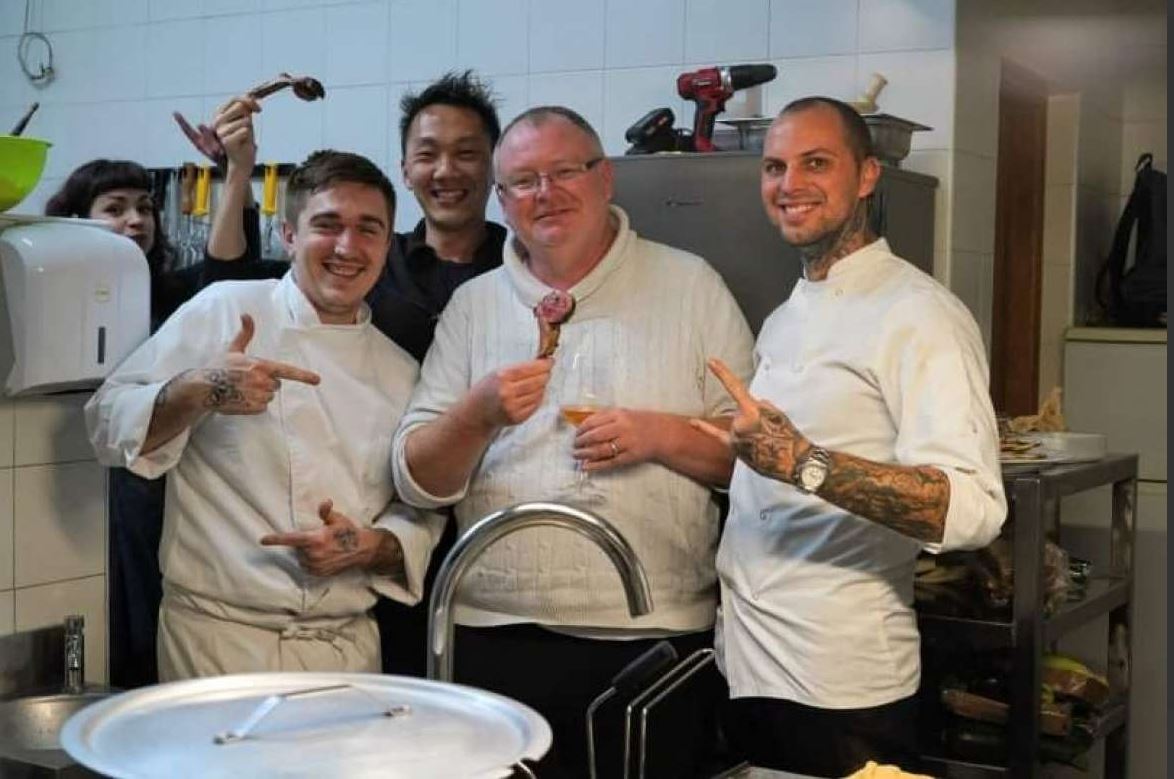Andrej Kramarić Scores 100th Hoffenheim Goal
January 23, 2022 - Andrej Kramarić scored his jubilee 100th Hoffenheim goal on Saturday, which was also his first goal after more than three months!
Andrej Kramarić scored in Hoffenheim's 2:3 home defeat against Borussia Dortmund on Saturday. The Croatian footballer equalized for 1:1 in the first minute of stoppage time in the first half. Kramarić played the whole match.
This was his first goal after more than three months, but also the jubilee 100th for Hoffenheim. This is only his third Bundesliga goal this season, the first since October 29 last year. He nailed the back of the net with a half volley, reports Jutarnji List.
"Of course, I'm overjoyed with my 100th goal for TSG. It really took a long time. I would like to thank my family, club, and teammates. My son was at the stadium for the first time today, I'm glad I managed to score in front of him," Kramarić said and commented on the match:
"I am extremely angry about the defeat because we played superbly. Dortmund had three shots in the box and scored three goals (official statistics say two, and the third goal is an own goal). We are not happy with the result, but the game was really good. It is clear to everyone that we were better. We need to keep building on this game so the results will come with which to climb the ladder."
Kramarić's Croatia national teammate Marin Pongračić entered the game for Borussia Dortmund in the 83rd minute.
Third place in the Bundesliga standings was confirmed by Bayer with a convincing 5:1 home victory against Augsburg. The absolute first name of the match was the Frenchman Moussa Diaby who scored three of the five goals for Leverkusen. Bellarabi and Alario scored for Bayer, and the only scorer for the guests was Maier.
Only the second league victory of the season was recorded by Greuther Fuerth, who beat Mainz 2:1 at home.
Stuttgart is penultimate in the rankings. This time they lost to Freiburg (0:2) and recorded their fourth defeat in the last five league appearances (with one draw). Croatian footballer Borna Sosa played the whole game for Stuttgart, and the scorers for the winning team were Ito (own goal) and Schade.
Union Berlin broke through to fourth place, winning 2:1 in Moenchengladbach. The hero of the match was Kruse with two goals. He scored the winning goal in the 84th minute.
To read more about sport in Croatia, follow TCN’s dedicated page.
Croatia Likely to Play in 2023 World Handball Championship Qualifiers
January 23, 2022 - Losing to Denmark on Saturday night in Budapest came with even more consequences outside of the Euros - Croatia will likely have to play in the 2023 World Handball Championship qualifiers this spring.
Not only did losing to Denmark in Budapest eliminate the last theoretical possibility for Croatia to reach the European Handball Championship semifinals, but it almost certainly left Croatia without a direct spot in the next big competition - the World Championships, to be played in Poland and Sweden in January 2023, reports Gol.hr.
In addition to the hosts Poland and Sweden and the current world champion Denmark, Europe will grant at least 12 national teams the chance to participate in the World Champs, three of which will qualify directly as the best at the current Euro held in Hungary and Slovakia, while nine will play in the qualifiers.
Thus, the three best national teams in this European Championship besides Denmark, Poland, and Sweden will qualify for the World Champs, which means that, in case Denmark and Sweden reach the Euro semifinals, then the fifth place will lead to a spot at the World Champs. The national teams that are third in the groups of the second round will play for fifth place, for which Croatia, which is currently at zero points, has a very small chance.
Even if Hrvoje Horvat's team wins against Iceland and the Netherlands, many other factors would have to coincide again for Croatia to finish third in this group, on Friday, January 28, play the game for fifth place, and only then, if Denmark and Sweden are in semifinals, win direct placement at the World Champs.
A far more realistic scenario is that this will not happen and that Croatia will have to play qualifiers. They will be included in the second round, for which the draw will be held this weekend in Budapest, at the end of the Euro. It is played in two games between April 11 and 17 this year, and the opponent will be some of the national teams that will play the first round between March 14 and 20.
2023 Handball World Cup Qualifiers:
First round:
Seeded teams: Austria, Belarus, Bosnia and Herzegovina, Lithuania, Northern Macedonia, Portugal, Slovakia, Slovenia, Ukraine
Unseeded: Belgium, Estonia, Faroe Islands, Finland, Israel, Greece, Italy, Romania, Switzerland
Second round:
Seeded: Czech Republic, Hungary, Serbia + six national teams from the European Championship (potentially Croatia)
Unseeded: nine first-round winners
To read more about sport in Croatia, follow TCN’s dedicated page.
Number of Pupils Positive for COVID Soars 67% Over Past Week
ZAGREB, 23 Jan 2022 - Over the last week, the number of primary and secondary school students infected with coronavirus increased by 67.5%, and it consequently made the number of students self-isolating skyrocket by 118%.
Last Monday, there were 7,095 positive children, while the numbers increased to 11,885 on last Friday, and this rise is ascribed to the fast-spreading Omicron variant.
This past Friday, 184 schools out of a total of 1,313 schools in Croatia, had online classes.
Share of positive pupils in daily caseloads continues to be 15%
The Education Ministry explains that the more daily caseloads of the infection in the general population, the more pupils get infected, however, all the time a share of the positive students in the caseloads continues to be roughly 15%.
Over the last week, the number of positive primary school children jumped 88.5% to 4,118 positive cases registered on Friday.
The ministry said that there would be no state-level online classes because there were schools without any case of the infection, and therefore, it is up to local authorities to assess the situation in their communities and to decide on whether children can go to school or whether they should switch to virtual learning.
For all you need to know about coronavirus specific to Croatia, make sure to bookmark our dedicated section and select your preferred language if it isn't English.
Mario Mandaric Expands Ugandan Well Project: Aims for 100 a Year
January 24, 2022 - After an incredibly successful start, celebrated Croatian chef Mario Mandaric aims to expand his Ugandan well project to 100 wells a year.
It all started at a car rental counter in Zagreb.
Boy meets girl.
Within days, he had convinced her to spend the winter with him in Africa. She suspected that he was probably trafficking people under his cover of digging wells in remote villages in Uganda, she had never been to Africa, and she had a fear of grasshoppers, as we have documented previously on TCN, but she decided to join him. Even though it was grasshopper season.
Together they would work with Water Help Uganda to donate and dig a well in a remote village in rural Uganda. In order to try and have a bigger impact, celebrated chef Mario Mandaric held a series of charity dinners with Zagreb's only Michelin Star chef, Bruno Vokal from Noel, with one dinner alone raising enough for a new well. Check out one of the meals of my time in Croatia in Michelin Starry Nights in Dubrava as Vokal, Mandaric Cook for Uganda. With Matea Kristic the charming hostess and donation collector, the couple soon had enough for three wells.

And so off they went...
To be honest, I feared for Matea. As lovely as she was, she seemed a little frail to endure the challenges of rural Africa, especially with that fear of grasshoppers.
How wrong I was!
Not only did she overcome her fear of grasshoppers by eating a large portion of them, but she more than got her hands dirty, and she certainly taught the locals how to dance.
The Imotski Shuffle is now going viral around the villages of Uganda.
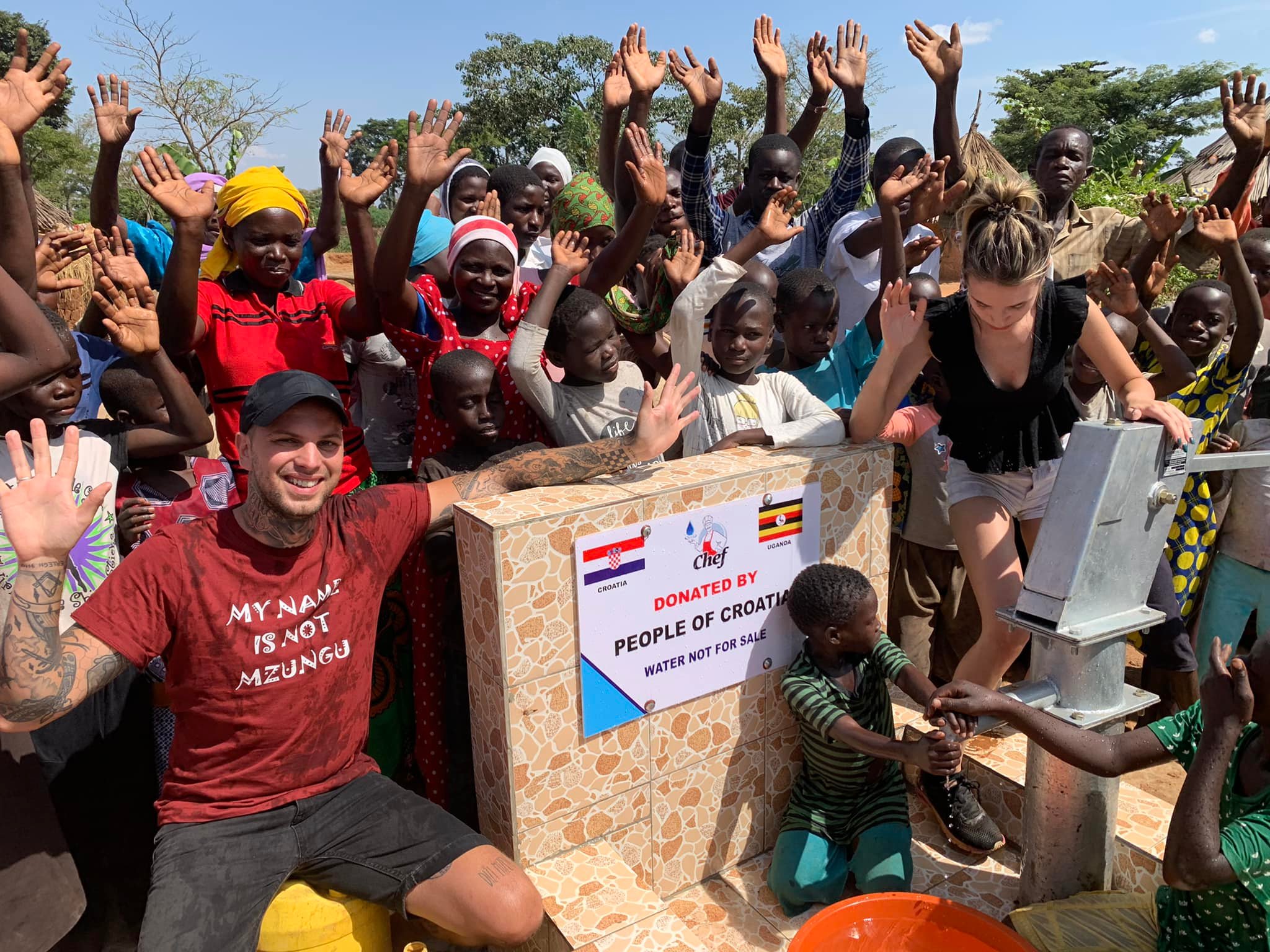
And a small investment can have a huge impact on the lives of village residents, who previously have had to walk for miles, often in swampy terrain which has claimed the lives of many of them, just for the most basic necessity of life - clean water.
As Mario explained to TCN:
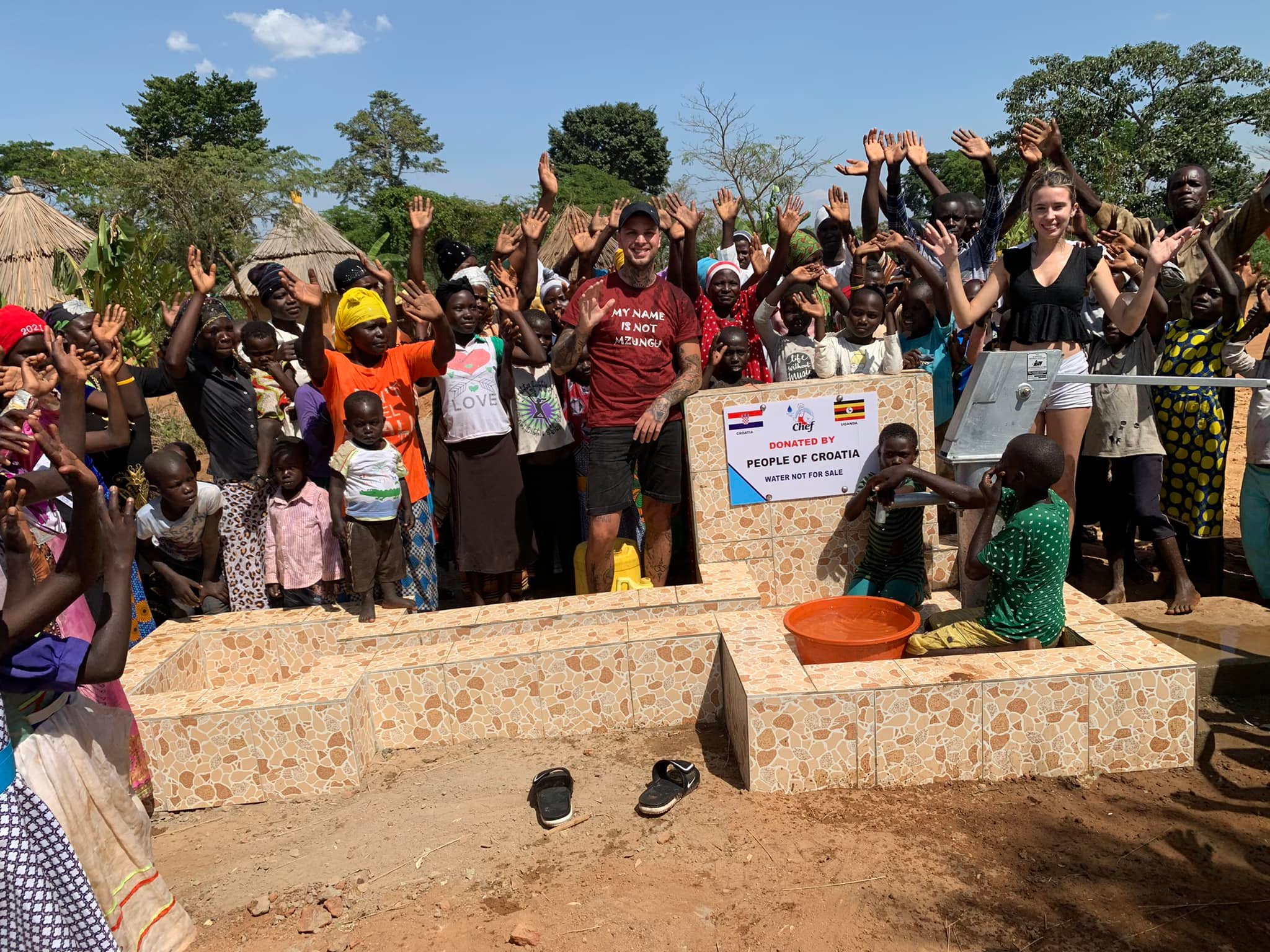
"Building a well has the power not only to save lives but to transform them too! Women and children in Africa walk for hours every day to collect water, often from dangerous and unsanitary sources, and must carry heavy loads of water, all just to fulfill their basic needs.
When you build a well in Uganda, you are liberating these women and children can go to school, crops can be watered and women can learn skills or just take the time to enjoy life with their families!"
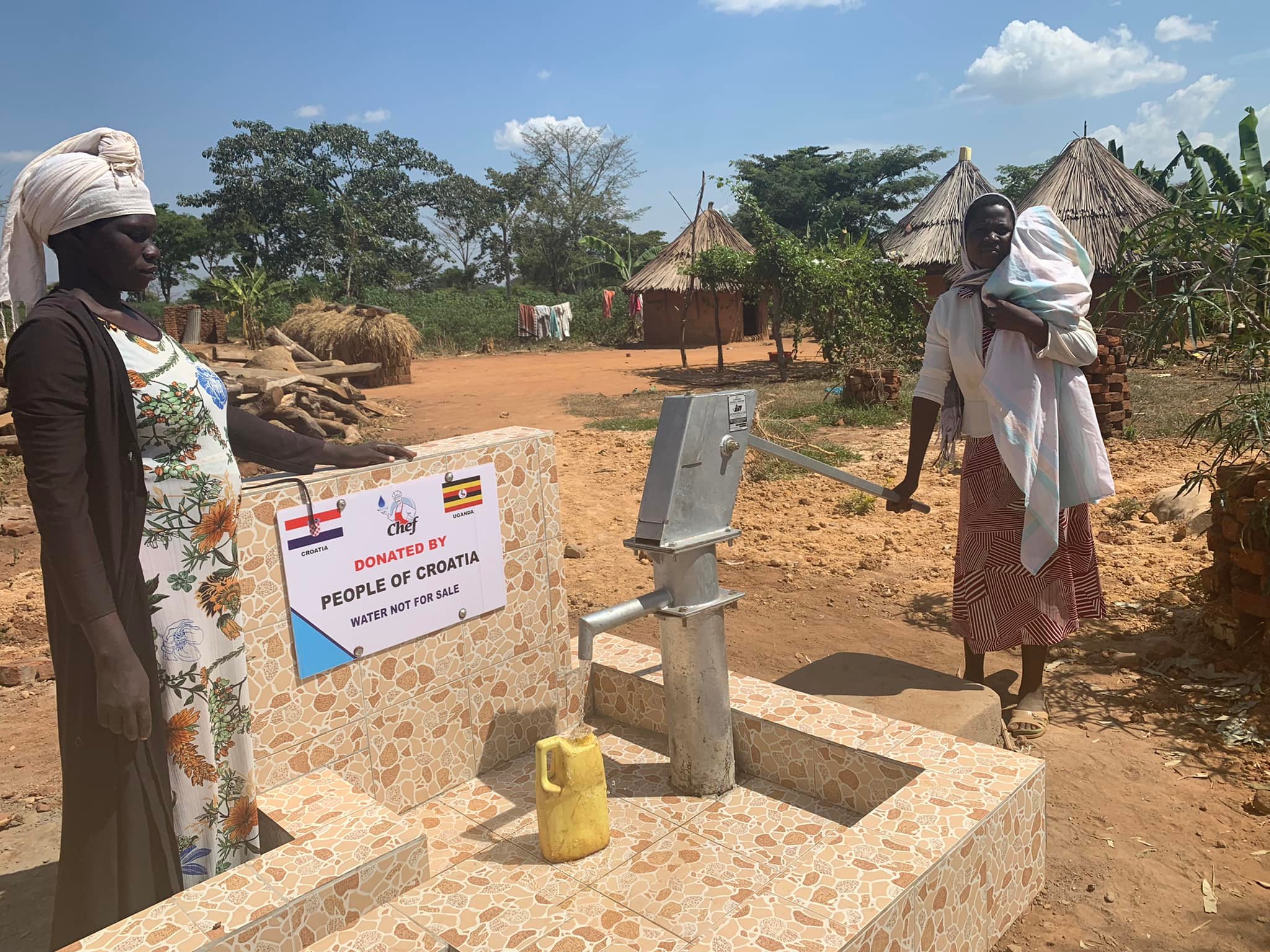
"Most of the kids in the villages have fathers who died by trying to get water from the swamps. This is a high-impact, low-cost initiative, with each well directly impacting about 300 people. We have been overwhelmed not only by the hospitality here, but also by the level of support for the project. From the original plan of our well and the ones from the dinners, we have already completed 14 wells, with three more in progress currently.
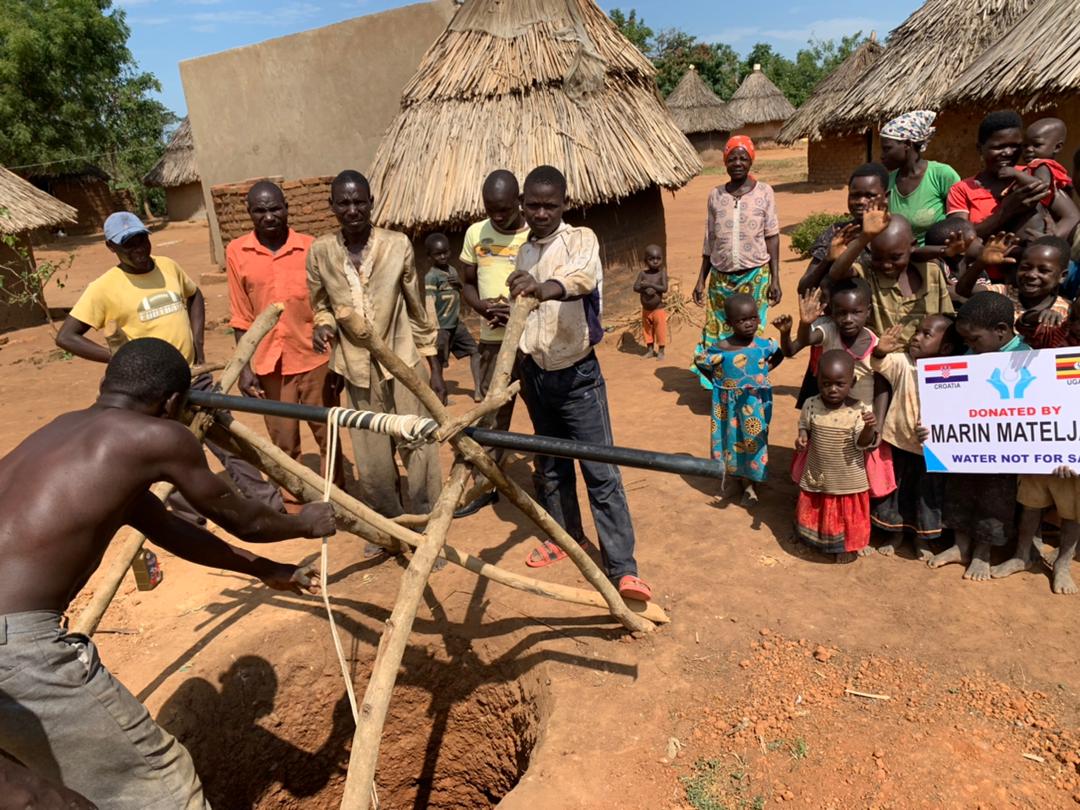
"Now the plan is to build 100 a year and by crushing the prices, so more people can afford to donate the well now. By connecting with the company from Kenya we managed to get the prices of the wells down to 1800 euro each. These now are the cheapest wells in Africa and they're the same quality as they were when they were 5000 euro.
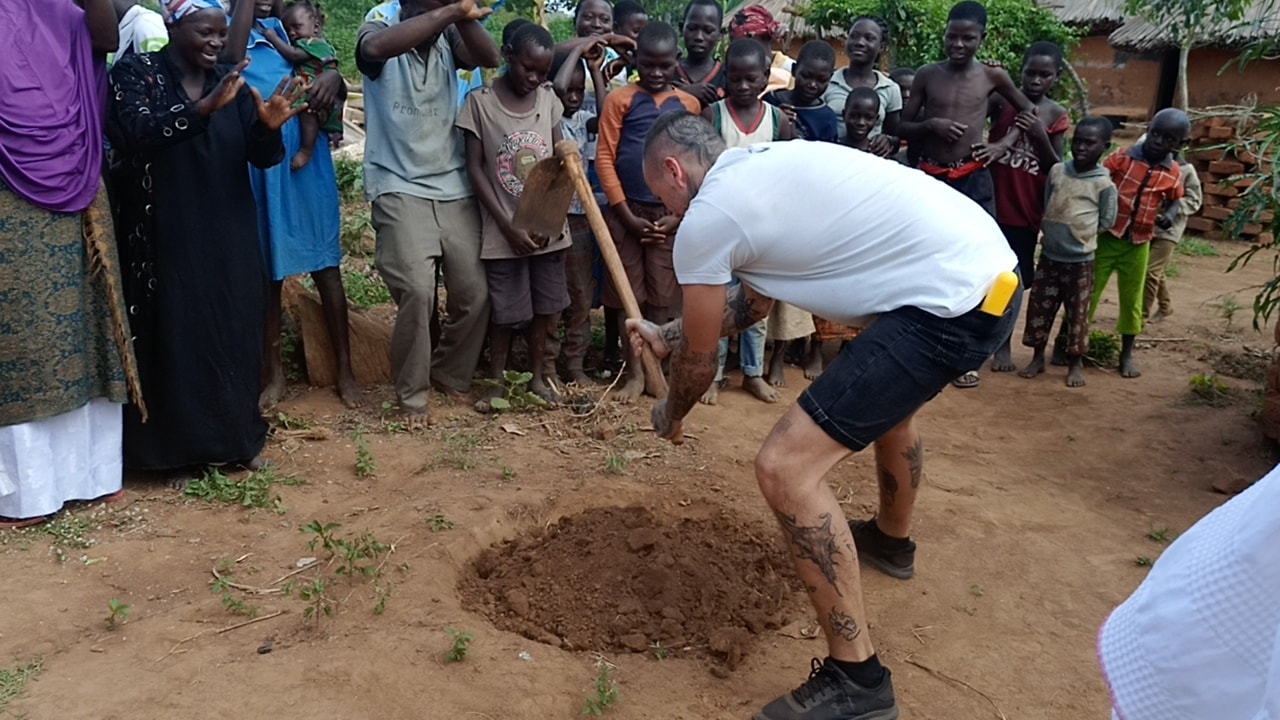
"When you donate a well, you get all the info about the village where the well will be, pictures of it being built, pictures of it in use, and stories of the people who benefit directly from it. Plus the 4 years warranty."

After a few weeks of experiencing Africa at its rawest, a well-earned break for the couple as they headed to Zanzibar to stay with Croatian tourism legend, Toni Raguz, whose luxury 5-star Baraza Resort and Spa Zanzibar Collection was named in the top 20 beachside hotels in the world, as well as the best in Africa. And Mario brought a little luxury cooking to the table, as part of the project awareness.
17 wells funded, 83 to go. Are you interested in donating to this great project? If yes you can contact Mario by WhatsApp on +255 772 323 468, via Facebook, or via his website. And if you do donate, think of the Croatian cultural promotion - the Imotski Shuffle could become a global thing.
And when the couple do return to Zagreb, he will be diving into rather a cool new gourmet project - teaser in Local Knowledge with a Foreign Eye: When Gourmet Visions Collide.
Responsible Hospitality over Sustainable Hospitality?
January 24, 2022 - It is always a pleasure to welcome back the thoughts of tourism expert Zoran Pejovic from Paradox Hospitality. This week responsible hospitality over sustainable hospitality.
Some might think that these are interchangeable terms, as they share the same theoretical space, but I beg to differ. In my mind sustainable practices are promoted top down, while responsible practices grow mostly grassroots, bottom up. Sustainable practices are largely environmental, as in "going green", while responsible practices are equally environmental, social and economical. Sustainable practices tend to be more universal, while responsible practices are more contextual. Lastly, but perhaps even most importantly, sustainable practices are more ideological, while responsible practices are more commonsensical.
For something to work, it has to make sense to all, or at least it has to make sense to the majority of the stakeholders. In order for it to makes sense, it has to be contextual and nested in the cultural, historical, geographical and socio-political background in which it is being applied. If it is nested in all of these contexts, it has to account for more than just the environment, so social and economical aspects are crucial. Once all these aspects are met, the practices have to be clearly communicated, without shaming, moral grandstanding and virtue signaling. Then, and only then, we can expect the majority to accept these changes and the cultural shift is imminent and inevitable. This is what I call responsible hospitality.
I thought that these characteristics should be obvious, but they are anything but. We have a chance, in the travel and leisure industry, especially in new hotel developments to institute principles that share all of those abovementioned characteristics. However, this will require more than just regurgitating corporate PR lingo and instead getting into the communities and environments where these developments are taking place. Only then one can understand and assign value and importance of certain practices, on an imaginary "responsible hospitality" scale for the given location. Only then, one can understand how and if, for example, low visual impact architecture is important, if the project should be low light and/or low audio pollution, should it have electric cars or not, does the use of local materials makes sense or not, are the local communities involved and happy to provide seasonal produce, how are the accessibility issues going to affect long term viability of the project and so on. And then, all of these have to endure the test of time, and have to be able to evolve in the everchanging contexts of the new knowledge and information that becomes available with the passing of time.
If there is anything that history teaches us is that what we thought yesterday was the best way forward, and this very much applies to the sustainable and green initiatives, is debated today and might be completely overturned tomorrow. Therefore, don't adopt it as an ideology, but as a philosophy, a framework for thinking.
You can read more from Zoran Pejovic on his TCN author page.
#responsiblehospitality
Dugopolje Croatian Cream Made From Grandma's Recipe Proves Hit
January the 23rd, 2022 - Croatian cream from Dugopolje, close to Split in the Dalmatian hinterland, has been winning over hearts (and skin) for half a century now, and the recipe has been passed down from generation to generation of this family.
As Poslovni Dnevnik/Slavica Vukovic/VL writes, Zora's ointment (Zorina mast), a natural Croatian cream for the treatment of burns and various other skin problems, has gained in fame for 50 years now, having been made by 84-year-old Zora Cipcic from Dugopolje. People came from across the country to Dugopolje because of Zora's healing ointment, and she made it according to a recipe that has been passed down through her family.
However, as the years went by, she gradually stopped making this much loved Croatian cream because her health no longer allowed for what was involved in its creation, but her 23-year-old grandson, Goran Cipcic, made sure that her beloved old recipe did not fall into oblivion. Two years ago, as a student, he founded a startup and won the Start Croatia competition, Zora's ointment was declared a hit and he fought for its place on the shelves of the likes of Spar and Interspar.
This much loved Croatian cream made using an old family recipe has obviously helped very many people, thousands of comments from satisfied users have been recorded on social media, and as a good name is heard far and wide, it has opened the door to other stores for young Goran. Not only that, he has also expanded the range, and since last September he has been offering a very similar Croatian cream for hands under the Zorina mast brand, and in mid-February this year, a new, unique face cream will be on the shelves.
“We designed Zorina Mediterranea face cream, which is completely different from everything else on the market. It's completely natural, it has most of the ingredients Zorina mast has in it, but it's additionally enriched with magnesium, salt flower and some seaweed. It lasts for more than 12 hours on the skin, strongly moisturises and deeply hydrates it, and it also improves the skin's elasticity and firmness. It will be on sale in about a month,'' Cipcic proudly announced.
These Croatian creams are more suitable for application on the face and hands because they are easily and quickly absorbed. "Given that Zorina mast is a brand of natural cosmetics and helps with many types of skin problems that people often face, we first expanded the range to include hand cream. Why did we do that? Well, ever since the novel coronavirus appeared, people have treated their hands extremely harshly with disinfectants, many of which irritate, damage and dry out the skin. We went it because our hand cream repairs damaged skin and protects it. All the ointment ingredients are also in this Croatian cream, but we've supplemented them more. One of the key ingredients is probiotics, which create an additional protective layer for the skin. That's how we connected Zora's traditional recipe with modern trends,'' explained Goran.
We do make cosmetics, but we didn't really focus on dermocosmetics, but instead on what helps the skin to be healthy, and thus beautiful and youthful,'' added Goran, revealing what makes this Croatian cream and the rest of the range unique.
“We're the only ones in production who boil a part of the substance used, thus avoiding the addition of other raw materials. It’s that recipe that I got from my grandma. Everything she did, I do too, only what was a litre to her, I have 15 litres, there are machines, nothing is industrial, we do everything by hand. My goal is not to grow enormous production, but to continue in the traditional way. That gives our products a soul,'' added Goran.
He makes this special Croatian cream and his sister helps him. Since he is an economist, he develops the recipes in collaboration with, he says, the formulator of natural cosmetics.
“I tell her what I want and she advises me on how best I might achieve it. We're already preparing some new products, the first will be a face serum,'' concluded Goran Cipcic.
For more, check out Made in Croatia.
Croatian-Austrian Startup PlanRadar Eyes Global Expansion
January the 23rd, 2022 - The Croatian-Austrian startup PlanRadar has made quite the impression on investors, and they're now eyeing global expansion.
As Poslovni Dnevnik/Marina Bilus writes, the founder of the Croatian-Austrian startup PlanRadar has stated that it is absolutely imperative for them that companies work globally with their application and that through such a presence, they continue to bring the greatest value to the industry in which they operate. They claim to want to be the trigger for true change by transforming construction sites across the world.
The founder of the Croatian-Austrian startup PlanRadar, Domagoj Dolinsek, summarised their ambitions, revealing for the first time that PlanRadar is embarking on a new round of raising fresh capital to continue on its path of global expansion, this time targeting primarily distant markets such as that of Australia and those of the Middle East.
Just a couple of months or so after revealing that, Dolinsek and his team achieved their goal by securing an impressive 69 million US dollars in Series B investments.
That investment line-up is led by Insight Partners and Quadrille Capital, and the existing investor Cavalary Ventures, as well as Headline, Berliner Volksbank Ventures and aws Gründerfonds, and Proptech1, Russmedia and GR Capital have also invested in this impressive company. The capital entrusted to PlanRadar will also serve to double their team in just one year and to increase the number of employees by as many as 200.
After the news of the exceptional success of this round of funding was officially announced, the Croatian-Austrian startup PlanRadar specified that their global expansion would include the opening of new offices in the USA, Australia, the Gulf Cooperation Council (GCC), Southeast Asia and Latin America.
"We'll encourage investment in the R&D department, create a new technology hub and form a team of product innovation experts to create new technology solutions for the SaaS platform that sets new industry standards," they explained from PlanRadar, adding that in just 18 months, from a previous 30 million US dollar investment, their revenue swelled by a massive 250 percent and their number of beneficiaries doubled.
Their platform, which brings together a wealth of site workflow data and structures it to make it instantly available to any construction project participant through a single mobile app, is used daily by 100,000 professionals in more than 60 countries around the world.
"Our mission is to facilitate construction work and property management and we've proven that there is a huge global appetite for our technology," said Ibrahim Imam, one of the co-founders of PlanRadar, while fellow co-founder Sander van de Rijdt added that the global PropTech is transforming an industry that has historically been reluctant to digitise.
“The PropTech sector is poised for tremendous growth, and the Croatian-Austrian startup PlanRadar is bringing the global construction and real estate industries into the digital future. The sustainable growth that PlanRadar has achieved is proof of their professional work and commitment. We immediately saw their potential, and their team continued to impress us with their commitment to growing customers, revenue and talent,'' said Thomas Krane, the CEO of Insight Partners.
"We're delighted to continue to encourage the rapid growth of PlanRadar and join the group of investors. We're extremely impressed with the technology, the team and the way it is helping to digitise the construction industry and the real estate sector,'' said Brice Delome, a partner at Quadrille Capital.
When Dolinsek revealed how they managed to transform the otherwise traditional construction industry into something more digital, he stated their formula for success - a user friendly application that, he claims, is simple for everyone who uses it, while at its heart has a huge anount of technological "machinery" that unites all complex compounds into a meaningful whole that is easy to manage via an app.
“Construction sites are quite complicated systems, and people associated with them often project this complexity through their way of working. But the trick is that by simply using the technological solution provided by PlanRadar, we eliminate the complexity of their workflow so that they work more simply, become more efficient and thus improve the sustainability and success of their projects,'' explained the head of PlanRadar.
For more, check out our dedicated business section.
Croatian Bus Carriers in Trouble Once Again: State Must Intervene
January the 23rd, 2022 - Croatian bus carriers are facing serious issues once again after being severely damaged by the global coronavirus crisis, restrictions placed on travel and a lack of state aid.
As Poslovni Dnevnik writes, due to the spread of coronavirus and the large increase in the number of people infected with it, an increasing number of schools across the Republic of Croatia are switching to distance learning (the so-called Model C), which puts Croatian bus carriers in an awkward position with major problems with their student transport contracts. This came as a warning from the Croatian Employers' Association (HUP), which pointed out the illogicality and non-functioning of contracts for the bus transport of students.
HUP explained that many Croatian bus carriers have contracted the transport of students for 180 days per year, but due to the closure of schools in some areas they were left without what was contracted and lost all of the income that was promised with it.
"We understand the reasons why schools switched to distance learning, but for us it means that the buses run empty or are forced to stop running completely. Of course, fixed costs such as utilities, fuel, leasing and the payment of wages to workers and drivers remain the same every month, regardless of which model the school we drive for decides to operate with. That's why it is fair to recognise that there is 'force majeure' in these contracts and to pay carriers at least the cost of a cold drive worth 50 percent of the agreed amount during which students have distance learning,'' said Damir Pavlovic from HUP, adding that otherwise the so-called model A will not mean the return of students to schools because there will be no one to transport them when the epidemiological situation finally does calm down.
''Most Croatian bus carriers won’t be able to cope with this''
HUP also made sure to note that the criteria and the way of co-financing the costs of public transport for the country's high school students are based on a government decision from back in 2018, long before the pandemic struck, where the calculation was based on the price of ordinary Eurodiesel, which then amounted to 8.37 kuna. Today, the prices of basic Eurodiesel start at a significantly higher 11.29 kuna, which is an increase of 35 percent, and fuel is a key input cost that largely defines the business of Croatian bus carriers.
"Due to the coronavirus crisis, bus transport is one of the most endangered industries because any spread of the infection reduces the number of regular passengers we transport. The epidemic has obviously entered its critical phase and we're asking the state to please try to adapt to these new circumstances. If we don't recognise the costs of cold storage for student transport and if we don't introduce the appropriate measures to preserve jobs, everything that has been done well so far will mean nothing, and take down the vast majority of bus operators who won't be able to withstand this pressure with it,'' concluded Pavlovic.
For more, check out our dedicated business section.
Croatian Employees Shun Emigrant ''Return Incentive'' Measure
January the 23rd, 2022 - The demographic crisis in Croatia long predates the current coronavirus-induced one, although it certainly hasn't helped matters. Those Croatian employees who decided to remain in the country and not go chasing their luck abroad have some suggestions.
As Poslovni Dnevnik writes, an on online survey conducted on the posao.hr/job.hr portal on the topic "Will the incentive measure stimulate people to return or will it cause resentment among others?" brings some interesting results in which it is stated that as many as 78 percent of respondents don't support this incentive measure. Only 2 percent of respondents will encourage this incentive measure for people to return to Croatia, while 64 percent of them believe that the amount of financial incentive isn't enough to make such a big life decision.
The aim of the research was to examine the effect achieved by deciding on an incentive measure for people living and working outside of the Republic of Croatia and those who remained as Croatian working employees, living and working in their homeland.
The posao.hr portal conducted the aforementioned survey, in which 253 respondents participated, of which 73 percent are Croatian employees, 22 percent of them work abroad, and the rest have a foot in both rooms, being partly in Croatia and partly abroad.
There is a level of indignation from Croatian employees when it comes to these measures.
Adopting a measure that will encourage the return of young people back home to Croatia, according to the research, has had a negative effect on people who decided to stay and who are Croatian employees. As many as 61 percent of them believe that the adoption of this measure does not appreciate their decision to grit their teeth and stay in the country.
When asked whether, by that logic, Croatian employees who decided to remain here should also receive financial support to stay in the country themselves, 85 percent of them answered in the affirmative.
Only 11 percent of the respondents supported this return incentive measure, while 78 percent of them clearly said that they did not agree with the granting of this type of incentive to people simply to return to Croatia. The respondents employed abroad clearly agreed that the incentive is an insufficient reason to leave well-paid jobs they have elsewhere.
When asked whether this amount of money would encourage them to return home and leave a well-paid job abroad, 64 percent answered that the amount is too small with the comments "… is not the point of return a one-time payment, but a reasonable standard upon return instead?", "I was a craftsman in Croatia for more than 20 years. Anyone who has experience of entrepreneurship in Croatia knows that the stated incentive of 150,000 kuna would be "eaten" by the state in a single year. And then what?''
When asked whether the measure would encourage them to return, only 2 percent answered in the affirmative, which is a clear indicator of how successful this measure will be, or perhaps not.
For more, check out our lifestyle section.
Plenković: We Have Weathered COVID-19 Crisis
ZAGREB, 22 Jan 2022 - Commenting on the average pay in Croatia having increased from HRK 5,642 (€750) at the start of his government's term to HRK 7,333 (€975), PM Andrej Plenković said in a Twitter post on Saturday Croatia had weathered the COVID-19 crisis.
"With our GDP growing strongly, jobs having been kept and public debt being reduced at a fast rate, we have overcome the COVID-19 crisis," the PM said.
He added that now, with reforms and secured EU funds, Croatia was about to achieve even faster growth and a better life for its citizens.
According to the national statistical office, the average pay in Croatia in November 2021 was HRK 7,333 while at the start of the current government's term, in October 2016, it stood at HRK 5,642.
(€1 = HRK 7.52)
For more, check out our dedicated politics section.


